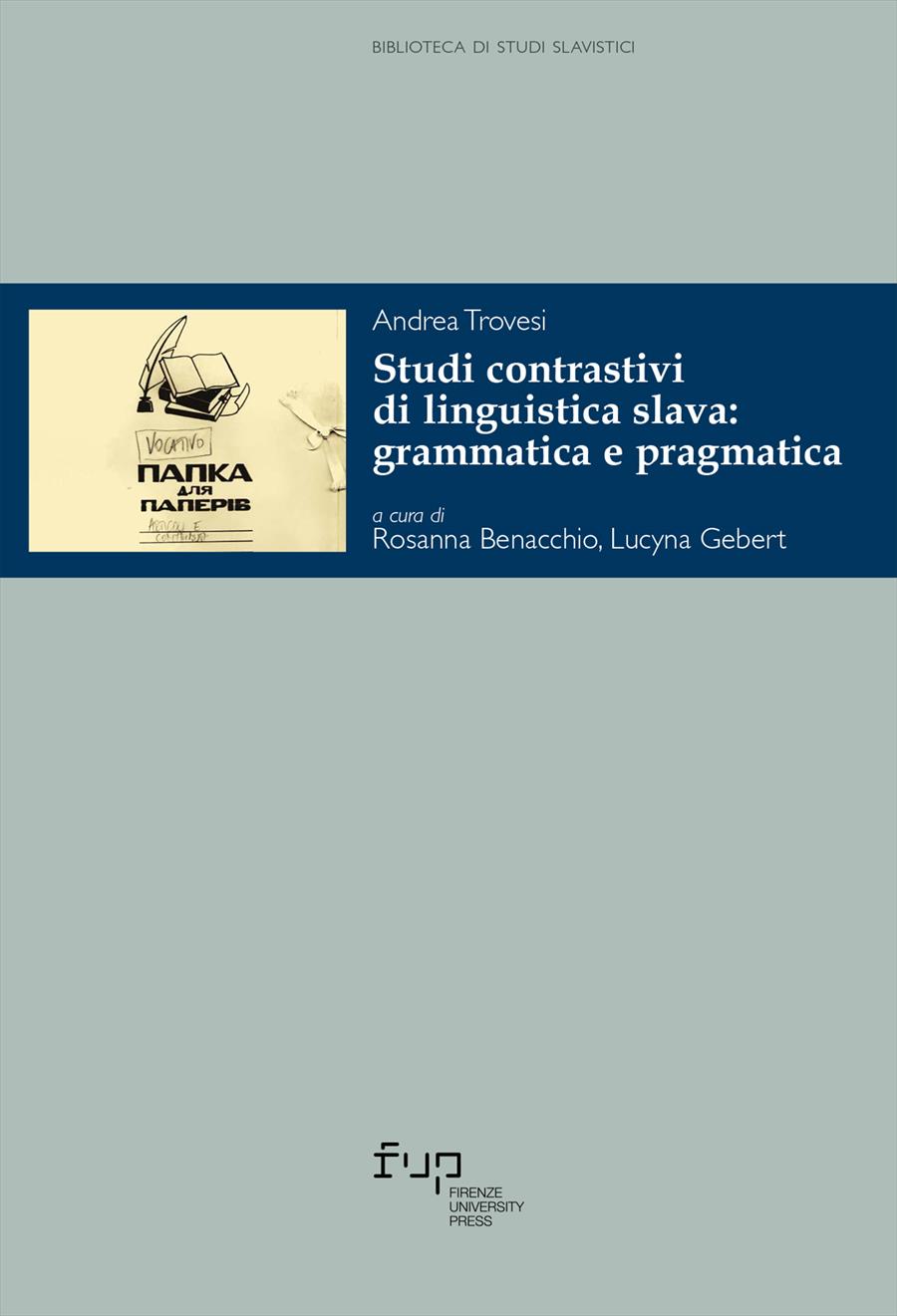The modal meaning za pripomnjane of the Bulgarian imperfect tense and its counterparts in other Slavic languages
- Andrea Trovesi
- © 2023 Author(s) |
- CC BY 4.0
- DOI: 10.36253/979-12-215-0216-9.16
Amongst Slavic languages, only Bulgarian (and Macedonian) has retained the imperfect, a synthetic past tense inherited from Protoslavic. Apart from its temporal meanings, the Bulgarian imperfect occurs in a variety of modal meanings, which, generally speaking, imply a modification in the epistemic validity of the utterance. The modal meaning za propomnjane ‘for reminding’ of the Bulgarian imperfective imperfect is used to ask for previously given but at present forgotten information. Based on previous research work on the subject, the paper aims to investigate whether and to what extent such a meaning can be expressed by verbal morphology in the Slavic languages that have lost the imperfect tense. The languages considered in the paper are: Bulgarian, Serbian (Croatian), Czech, Polish and Russian.
- Keywords:
- Bulgarian,
- Imperfect tense,
- Modal meanings,
- Slavic languages,
- Contrastive analysis,
Sapienza University of Rome, Italy - ORCID: 0000-0001-7107-5657
- Bazzanella, C. 1994. Le facce del parlare. Un approccio pragmatico all’italiano parlato. Firenze: La Nuova Italia.
- Berretta, M. 1992. Sul sistema di tempo, aspetto, e modo nell’italiano contemporaneo. In B. Moretti, D. Petrini, S. Bianconi (a cura di). Linee di tendenza dell'italiano contemporaneo. Atti del XXV congresso internazionale della Società di Linguistica Italiana. Roma: Bulzoni: 135-153.
- Bres, J. 2005. L’imparfait: l’un et/ou le multiple? A propos des imparfaits ‘narratif et ‘d’hypothèse'. In: E. Labeau, P. Larrivée (texts réunis par). Nouveaux développements de l’imparfait. Amsterdam-New York: Rodopi: 1-32.
- Bres, J. 2009. "Dialogisme et temps verbaux de l’indicatif". Langue française 163: 21-39.
- Bres, J., Mellet, S. "Une approche dialogique des faits grammaticaux". Langue française 163: 3-20.
- De Mulder, W. 2012. "Un sens épistémique pour l’imparfait et le passé simple?". Langue française: 99-113.
- Desclés, J.-P., Guentchéva, Z. 2004. Imparfaits bulgare et frangais: confrontation sur une valeur sémantique. In R. Vlaxova, J. Tiseva (éds.). Kognitivna gramatika na bălgarskija i frenskija ezik - Opisanie i formacija. Sofia: Akademično izdatelstvo “Marin Drinov”: 10-33.
- Guentchéva, Z. 1988. "L’aspect et le fonctionnement de l’imparfait imperfectif en bulgare". Revue des Études slaves LX/2: 393-404.
- Guentchéva, Z. 1990. Temps et aspect: L’exemple du bulgare contemporain. Paris: CNR.
- Guentchéva, Z. 1994. "Imparfait, aoriste et passé simple: confrontation de leurs emplois dans des texts bulgares et français". Studia kognitywne 1: 163-181.
- Kovačević, M. 2008. "O dejktičkoj upotrebi imperfekta". Srpski jezik XIII: 149-161.
- Maretić, T. 1963. Gramatika hrvatskoga ili srpskoga književnog jezika. Zagreb: Matica Hrvatska.
- Mrazović, P. 2009. Gramatika srpskog jezika za strance. Sremski Karlovci-Novi Sad: Izdavačka knjižarnica Zorana Stojanovica.
- Nannoni, C. 2004. L’imperfetto tra linguistica e traduzione (francese-italiano). Trieste: EUT.
- Nicolova, R. 2008. Bălgarska gramatika. Morfologija. Sofija: Universitetsko izdatelstvo “Sv. Kliment Oxridski”.
- Pašov, P. 1999. Bălgarska gramatika. Plovdiv: Xermes.
- Patard, A. 2011. The epistemic uses of the English simple past and the French imparfait. In A. Patard, F. Brisard (eds.). Cognitive Approaches to Tense, Aspect, and Epistemic Modality. Amsterdam-Philadelphia: John Benjamins: 278-310.
- Patard, A. 2014. "When tense and aspect convey modality. Reflections on the modal uses of past tenses in Romance and Germanie languages". Journal of Pragmatics 71: 69-97.
- Roglić, V. 2000. Imperfekat u francuskom i srpskom jeziku. Mrljeg Beograd.
- Rusinov, R., Georgiev, S. (săst.). 2000. Enciklopedija na săvremenija bălgarski ezik. Veliko Tărnovo: IPK “Sveti Evtimij Patriarx Tărnovski".
- Sladojević, Č.P. 1953-1954. "O imperfektu u srpskohrvatskom jeziku". Južnoslovenski filolog XX: 213-228.
- Squartini, M. 2001. "The internal structure of evidentiality in Romance". Studies in Language 25: 297-334.
- Stankov, V. 1966. Imperfekăt v săvremennija bălgarski knižoven ezik. Sofija: Bălgarska akademija na naukite.
- Stankov, V. 1994-1995. "L’imparfait bulgare d’un point de vue cognitif". Balkansko ezikoznanie 37.1-2: 96-114; 3-4: 191-209.
- Stanojčić, Ž. 2010. Gramatika srpskog književnog jezika. Beograd: Kreativni Centar.
- Stevanović, M. 1953-1954. "Značenje imperfekta prema upotrebi u jeziku Р.P. Njegoša". Južnoslovenski filolog XX: 39-80.
- Stevanović, M. 1959. "Oko značenja imperfekta". Zbornik filološkog fakulteta IV-2. Univerzitet u Beogradu: 119-143.
- Stevanović, M. 1964. Savremeni srpskohrvatski jezik (gramatički sistemi i književnojezična norma), I: Uvod, fonetika, morfologija. Beograd: Naučno delo.
- Stojanov, S. (red.). 1983. Gramatika na săvremenija bălgarski knižoven ezik, II. Morfologija. Sofija: Bălgarska akademija na naukite.
- Stojićević, A. 1951. Značenje aorista i imperfekta и srpskohrvatskom jeziku. Ljubljana: Slovenska akademija znanosti in umetnosti.
- Trovesi, A. 2018. Valori modali dell’imperfetto in bulgaro e in italiano. Una rassegna contrastiva. In F. Bermejo Calleja, P. Katelhön (a cura di). Lingua parlata: Un confronto fra l‘italiano e alcune lingue europee. Berlin: Peter Lang: 247-265.
- Vuković, J. 1955. Sintaksička vrednost imperfekta u savremenom srspkohrvatskom jeziku. Sarajevo: Naučno društvo NR Bosne i Hercegovine.
Chapter Information
Chapter Title
The modal meaning za pripomnjane of the Bulgarian imperfect tense and its counterparts in other Slavic languages
Authors
Andrea Trovesi
Language
English
DOI
10.36253/979-12-215-0216-9.16
Peer Reviewed
Publication Year
2023
Copyright Information
© 2023 Author(s)
Content License
Metadata License
Bibliographic Information
Book Title
Studi contrastivi di linguistica slava: grammatica e pragmatica
Editors
Rosanna Benacchio, Lucyna Gebert
Authors
Andrea Trovesi
Peer Reviewed
Number of Pages
204
Publication Year
2023
Copyright Information
© 2023 Author(s)
Content License
Metadata License
Publisher Name
Firenze University Press
DOI
10.36253/979-12-215-0216-9
ISBN Print
979-12-215-0215-2
eISBN (pdf)
979-12-215-0216-9
Series Title
Biblioteca di Studi Slavistici
Series ISSN
2612-7687
Series E-ISSN
2612-7679
